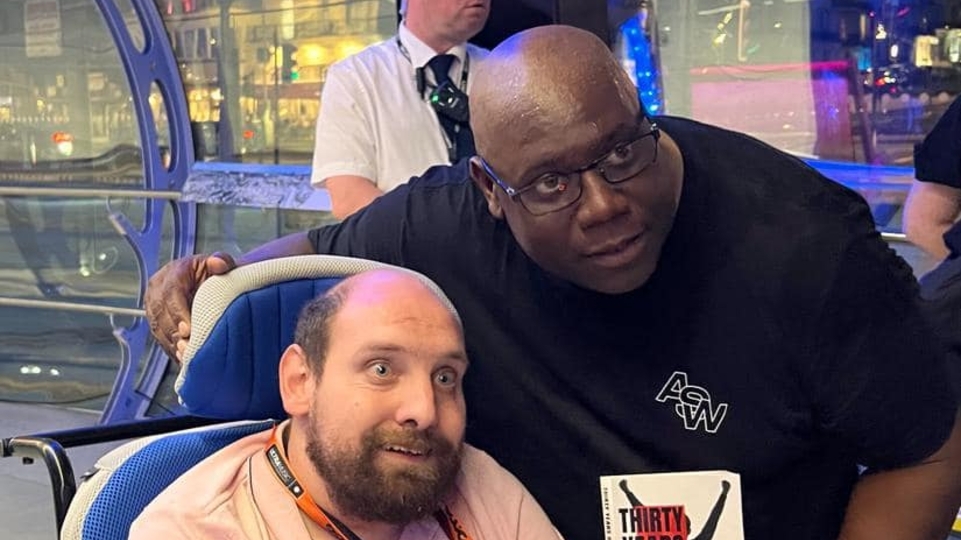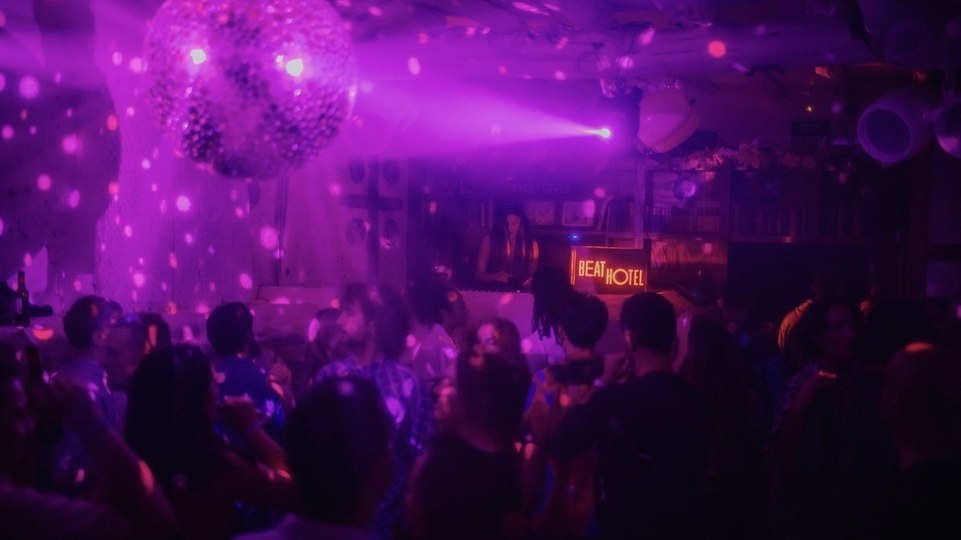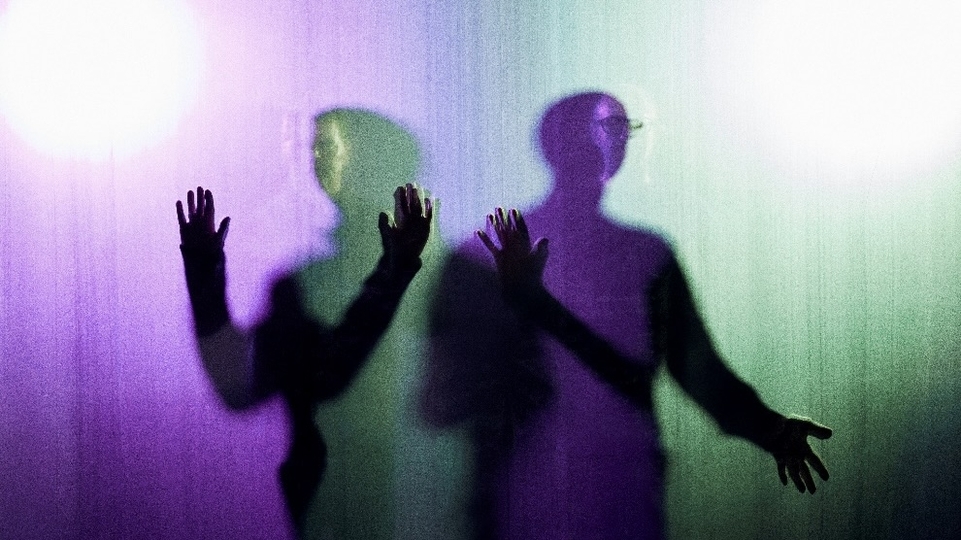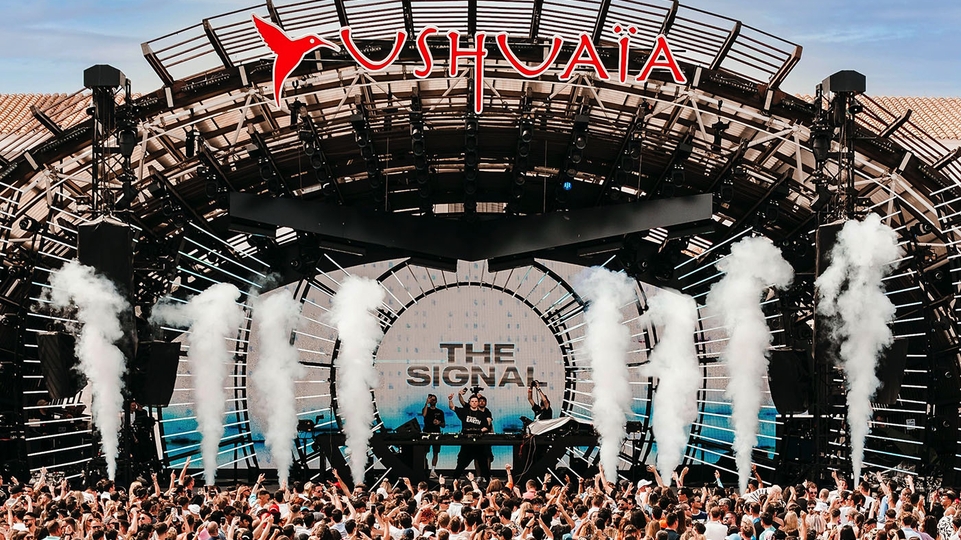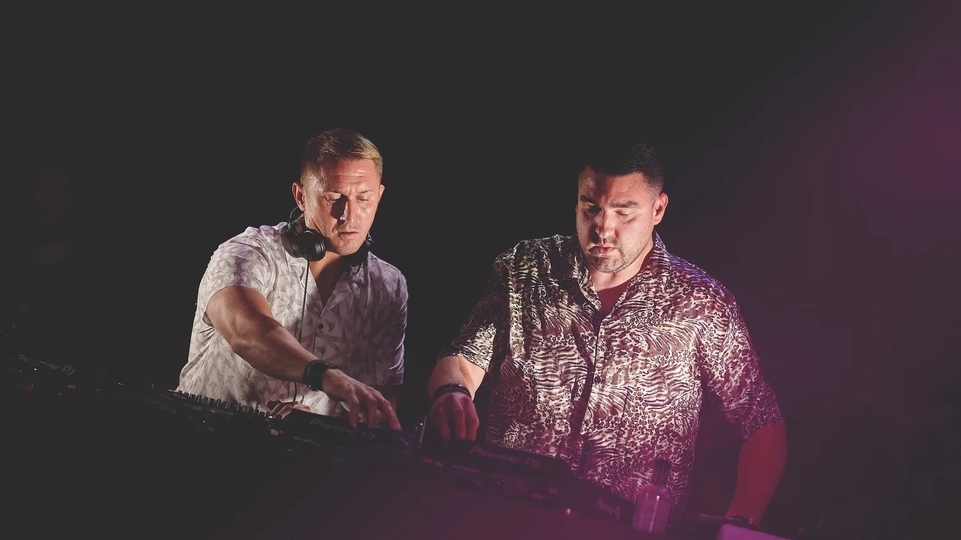
Jamie Jones: Paradise Found
After eight seasons at DC-10 in Ibiza and two lost to the pandemic, Jamie Jones makes his grand return to Ibiza this summer, and is moving his flagship party, Paradise, to Amnesia Ibiza. For his DJ Mag cover feature, Anna Wall speaks to the Hot Creations boss about coming up in the East London after-hours scene, mentorship, and becoming a dad
It was a humid summer night in June on the white isle back in 2005. Jamie Jones had just returned from Barcelona’s annual Sonar festival and was en route to Amnesia. It was Cocoon — Sven Väth’s imprint and party that has resided on the island since 1999 — and Jamie was on the dancefloor, surrounded by 20 of his friends who were scattered across the terrace. “I realised that no one had said a word for a few hours,” Jamie recalls.
It was the early hours of the morning, sunlight streaming through the terrace onto the unassuming clubbers below. He was next to Damian Lazarus — one of his long-time friends and mentors — and they shared a moment of realisation together in what they were experiencing, entranced by all these forms of house music that they’d never heard before. “It gives me goosebumps and shivers thinking about it,” remembers Jones, talking to DJ Mag from his home in Ibiza.
This was one of a few definitive moments that set him on a path of dedicated digging, delving into back catalogues and records from the past that would soon be weaved into the music he’d been collecting at the time. Fast-forward to 2022, and after an eight-year residency at DC-10, Jamie will play in that iconic booth on that exact same terrace, bringing his long-standing party Paradise to Amnesia for a 16-week season.
Jamie has long been an unstoppable force of nature in the music industry. His professional story begins back in the early 2000s as a hard-grafting DJ building a reputation on the circuit in London, moving on to headlining the world’s most prestigious clubs and festivals, co-founding the globally recognised label Hot Creations, running the highly successful party Paradise, and releasing records that defined an era.
During the early/mid-‘00s there was a new wave of house music emerging from London that was causing a ripple effect much further afield, and Jamie and his friends were at the helm. People strived to pigeon-hole the sound; first it was filed under ‘deep house’, then later ‘tech-house’, but one thing was for certain, his releases had dancefloor sensibilities with a much wider appeal.

“I always loved the breaks. All my friends liked gabber, which was a bit hectic for me, but I liked happy hardcore, like DJ Dougal and Slipmatt. You’d have the tape-packs, share them around your friends in your village with one ear in, walking around town listening to your favourite mixtape"
Jamie grew up in Caernarfon, a rural and aesthetically beautiful port town in Gwynedd, North Wales. It has a medieval castle and minimal population — the nearest city Bangor is a 10-mile drive. It’s a trip that Jamie would do often as a teenager, to frequent the one record shop in town. “I was super into rave culture, being a teenager in the early ‘90s in the UK, it was just everywhere,” he says. “You’d have the pop hits on the radio like 2Unlimited, Urban Cookie Collective and The Prodigy.”
Jamie would pick up rave magazines like Eternity and Dream, enamoured by the photos taken at large scale raves like Fantazia and Dreamscape. He remembers being obsessed with the mixtape packs that they sold at the record store. “When I was 14 I was really into happy hardcore,” he recalls. “I always loved the breaks. All my friends liked gabber, which was a bit hectic for me, but I liked happy hardcore, like DJ Dougal and Slipmatt. You’d have the tape-packs, share them around your friends in your village with one ear in, walking around town listening to your favourite mixtape. The funny thing is, they all kinda played the same songs, just in a different order,” he laughs.
“I used to get the magazines every month and would love reading about these raves and dream of going one day,” he continues. The ads in the back of these magazines led him to his first pair of decks; a basic mixer and two belt-drive turntables, kindly bought for him by his mum for Christmas at the age of 16. “I got them and I didn’t know anyone else with decks at all, so I didn’t have a clue. I bought two hardcore records, and realised I don’t even like this music and then bought house after that. My first house record was Kim English ‘Nightlife’. Then I bought the hits like Boris Dlugosh... great music and great records. All the hits of that time are actually good songs, whether it was Gusto ‘Disco’s Revenge’ or all the ones coming out on Manifesto and all those kinds of labels, they were good records. They stand the test of time.”
He was also inspired by the sounds of New York, and records by Masters At Work and other classic house started to appear in his ever-growing collection. His belt-drive turntables were set up in his bedroom, and he was determined to learn how to mix. “I still didn’t know what to do,” Jamie admits. “It sounds so silly but back then there was no YouTube, there was no internet,” he laughs. “I had no one to teach me, no one to show me. I just scratched my head for a few months, just buying records and not really knowing what I was doing.”


Jamie listened to Pete Tong’s Essential Selection on BBC Radio 1 religiously, and one weekend Pete had invited Carl Cox onto the show as a special guest, who live on air explained the art of a good mix. Then something clicked. “I was hooked, I was running home from school every night to mix in my room on the belt- drives. Then I had a gig in my student union in Bangor, my first ever gig. I used to work in this sports shop in Bangor every day with this guy called Jared, and one of his friends worked in the sports and culture department of the university. They had their annual party and he’d heard one of my mixes on in the shop and he was like, ‘Why don’t you come and mix for us?’ So I went there with this massive box, like 100 records, it was super heavy.”
When Jamie arrived for the gig, he found that the record decks provided were Technics. “I didn’t even know I had belt-drive turntables, and it’s completely different, like so so different and I was clanging every mix,” he remembers. “It was so bad. Luckily my friend had come with me, he was a year older than me and he had some Numark direct drives and he just took over. He was able to mix a little bit, and saved my day. Still to this day that was my worst ever gig,” he laughs.
We can only learn from our experiences and Jamie has come a long way since then; these days he’s naturally accustomed to playing in front of crowds of thousands. Jamie moved to London when he was 18, and it was these formative years spent in the city that he still talks about as some of the favourite years of his life. He began playing out nearly every weekend, at parties like Dig Your Own Rave at the now defunct T Bar in Shoreditch, east London.
Other parties he was associated with such as Kublicle — a party ‘run by music lovers for music lovers who like to party in intimate surroundings’ — were known for throwing events at unassuming Shoreditch venues, former strip-joint Metropolis, and most famously at Public Life, which was once a public toilet in Spitalfields. “In my life as a clubber, the early 2000s to 2007-8 was my peak and I was constantly out,” Jamie says. “It was before I started touring and was away most weekends, but up until then I was just hustling as a DJ in East London. It was an amazing time in Shoreditch, it was before a lot of money moved in (to the area).”

Jamie is on a roll with the reminiscing now. “I used to do a party just off Brick Lane, I did four or five parties in a warehouse space there. It was 800-1400 people, a completely illegal party and the police just didn’t care. Another one in an abandoned Quick Fit garage with 1700 people, a squatter broke us in, and Kubicle was there. It was an amazing time for me and my friends, going from Friday until Saturday, then Sunday night, going from warehouse space to loft, to pub, to apartment, just party to party. It felt really raw in East London then, and it was great music.”
This was all in the days before social media, when parties would have to be promoted by more old school methods. “I remember to promote my night I’d have to go down on a push-bike with a friend and put posters up on all the fly boards. That was the only way you could advertise your night — by getting paste, going to the printers and printing off 500 posters and plastering them everywhere. That was the only way to advertise that you had a party going on.”
Jamie speaks affectionately about those times, when the scene was small and intimate, but also thriving. “It’s amazing to see the scene grow. One of the good things about having a smaller scene like that is that everybody knew everybody.” The Sunday parties in particular attracted a dedicated and passionate crowd; often the ones that liked to live outside of the usual constructs of a 9-5 job. “It was much harder to discover this scene back then,” he believes. “If you actually discovered it, someone would have brought you there. There was no randomly discovering Public Life on a weekend in London from Timbuktu. No one really knew... the DJs that were playing were all unknown DJs. There was no social media, so unless you happened to walk around Shoreditch and be curious about a poster of a line-up you’d never heard of, in a place you’d never heard of, and you decided to go, you weren’t stumbling across it.”


“It was a legendary house. I had a studio there, we had five bedrooms. All the DJs would stay there, whether it’s Seth Troxler, Wolf & Lamb, Art Department, Soul Clap, everyone lived there at some point. I lived there the whole time we had it. Richy Ahmed lived there, Lee Foss, Kenny Glasgow, Mark Jenkyns. It was a non-stop party, a music making rave house”
He recalls how everyone was so engrossed in the music that they didn’t mind that there was little or no financial renumeration involved at the time. “There was no money in underground music back then,” he says. “Even the big DJs at the time didn’t really get paid that well. Everyone was there because they really loved that sound or that music, and being in that environment.”
It was during this time that he became friends with Lee Foss, who together with Jamie co-founded the record label Hot Creations. They met on the dancefloor of DC-10 back in 2001 through his long-time friend and brand manager Dionne. It was during the club’s early years, when it started life as an after-hours venue, still to be discovered by many and yet to become the full powerhouse it is today. There was always room to dance, and Jones remembers that the weird and wonderful characters would always stand out. Lee was one of them; he was donned in one glove and pulling moves on the dancefloor to showcase this said glove: “We became friends because we were both budding DJs and ended up living together over the next few years.”
Jones and Foss both shared a mutual love for disco, spending plenty of after-hours sessions playing classics to each other on their laptops. They launched a party called Hot Natured in Miami, and began producing music together under the same name. It was around the same time that Jamie met Ali Love and Luca C, and a collaboration naturally followed, with all four of them ultimately making up the four members of Hot Natured. Most of the music-making went on in Jamie’s then home in East London, one that became iconic amongst DJs and friends in the scene.
“It was a legendary house. I had a studio there, we had five bedrooms. All the DJs would stay there, whether it’s Seth Troxler, Wolf & Lamb, Art Department, Soul Clap, everyone lived there at some point. I lived there the whole time we had it. Richy Ahmed lived there, Lee Foss, Kenny Glasgow, Mark Jenkyns. It was a non-stop party, a music making rave house.”
Lee, Jamie and Ali made the propulsive house song ‘Forward Motion’, and more tracks began flowing. “I’d come back on Sunday from touring and I’d buy a bottle of Jameson whiskey — we were all into drinking whiskey at the time. Before I knew it, it was Tuesday afternoon. Me and Ali had been up from Sunday until Tuesday in the studio. All the whiskey was gone. I’d go back to the recordings and it was like five hours of me jamming out a beat or playing some bassline and Ali singing absolute nonsense melodies into a microphone,” he laughs. “Somehow, through all that madness, we made and released so much music. Albums, tracks, remixes... it was a brilliant time.”

Jamie is very humble; he had no idea the global impact that tracks like ‘Forward Motion’ would have. The record kicked off in nightclubs while simultaneously making an impact on the airwaves. It was an instantly recognisable song that could be heard echoing across the clubs of Ibiza, and it turned into an unassuming summer hit. Basslines are a focal point in Jamie’s productions; whether they are moody, or bouncing and melodic, and with ‘Forward Motion’ the bassline followed Ali Love’s vocal hook. It was stripped back and effortlessly catchy. His remix of Azari & III’s ‘Hungry For The Power’ dropped at around the same time and its success followed suit. It came as a surprise to Jamie, who road-tested the remix in Miami, and with an average crowd response wished he’d had time to re-submit something new. Six months down the line it was heralded as Pete Tong’s Essential New Tune of 2011, and it was another record that helped him to become one of the most in-demand DJs.
Rewinding a little bit, 2006 had seen Jamie’s debut EP come out on Dan Ghenacia’s Freak N Chic, followed by a string of releases and a debut album ‘Don’t Remember The Future’ in 2009 on Damian Lazarus’ Crosstown Rebels. He cites both label founders as two of his most influential mentors in the industry. “I lived with Dan and his wife in Ibiza one summer, they let me stay in the spare room. I played him my first record ‘Amazon’, he signed it and he really inspired me musically. He really helped me get it through the door as an artist,” says Jamie.
“The other person was Damian Lazarus,” he continues. “What Damian was doing at City Rockers before he started Crosstown Rebels was hugely influential on me, I was really inspired by that more housey side of electroclash. I’m still really into electro, so that was a pivotal time for me.”
Freak N Chic and Crosstown also happened to be his two favourite record labels at the time. “Damian is brilliant at developing artists. Being involved in helping them discover their sound and discover their voice, he’s really good at that. He works tirelessly and has a real passion for the details. Damian and I have a lot of similarities in that we’re quite good at the business side of things as well. Seeing opportunities to put on parties, or discovering artists, over the years I think I’ve done a pretty good job at discovering artists with Hot Creations. I definitely learnt a lot of that from Damian because he’s been running Crosstown Rebels for a long time now, a lot of artists have come through. Seth and I both came through Crosstown Rebels, so did Maceo Plex. Thinking about those three artists that have come through Crosstown Rebels during that period, we’ve all done pretty well for ourselves I think,” he smiles.


“Damian Lazarus is brilliant at developing artists. Being involved in helping them discover their sound and discover their voice, he’s really good at that. He works tirelessly and has a real passion for the details. Damian and I have a lot of similarities in that we’re quite good at the business side of things as well"
Jamie is proud of the work he’s done to build up Hot Creations to the level of success that it has reached now, and so he should be. The label is onto its 191st release, a mammoth number to achieve since its beginnings in 2010. Jamie believes the most important part of having the imprint is being able to help build the careers of up-and-coming artists. Over the last decade, the label has helped put artists such as Danny Daze, Patrick Topping, Richy Ahmed and wAFF on the map. Jamie loves giving artists a leg-up in the industry, and helping them believe that they can make a go of it is one of the most rewarding aspects of the job. “I know these lads come from a similar background to me where you don’t have anything to fall back on financially, so until you start getting some gigs you’re struggling to pay your rent every month,” Jamie remarks.
“To see someone like Patrick Topping or Richy Ahmed be able to go from working your socks off to make tunes and to find tunes, to then being able to say that you’re comfortably getting enough gigs to be happy, seeing that part for me — and being able to help people get to that point — is one of the best things about my whole career for me. Without a shadow of a doubt.”
From his own experiences Jamie understands the importance of having the right people around him. He has a loyal and dedicated team that feel like family; many of them are friends that he met right at the start of his career. He has over 20 years of friendship with his brand manager Dionne; his business partner and manager Jazz came to his first gig in America in 2008; Will has been his agent since day one, and there’s plenty more who are integral parts of the Paradise family.
“It definitely helps me because I trust those people with everything. I trust their opinions. It’s good because they also have that culture rooted in them, the same culture as me — the East London rave scene, the Ibiza scene,” Jamie says. “They’ve watched DC-10 go from the after-hours at 8am in the morning that got shut down by the police every Monday to the mammoth that it is now. Tours all over the world, packed out clubs. They’ve seen all the same things I have, they are very grounded in that way and they can help me make decisions.”
Jamie’s family mindset channels back to his home life too. Last year he became a father, now more than ever appreciating the importance of having family time at home together. During the winter he takes a break from touring, and nowadays he makes sure he flies home in between gigs and is taking at least one weekend off a month this summer so that he can spend quality time with his daughter.
Despite the hardships of the pandemic, he managed to keep everything afloat and continued the Hot Creations output. “It’s been difficult over the last two years to get artists from here to there because there’s not been any shows. So I feel like people who have released music over the last two years haven’t had the same support around the music and their growth, without me playing their record every week and people filming it and shazaming it,” he says. “I tried to push things around so a lot of the releases were ones that might do better on Spotify, for example. Still music that I was planning to release, but I tried to focus it on things that were a bit more home listening rather than ones that needed to be heard on a big system.”

Although the days of those whiskey-fuelled studio all nighters in that East London house are something of the past, Jamie still produces an impressively high output of music. He has a studio rented in London, and one at home in Ibiza. “I create quite a lot of ideas on the road,” he says. “I get back from gigs and I’ll be humming something and jot down some basslines. I work quite a lot by creating ideas on my laptop when I’m travelling, then I’ll go and take those into the studio and re-do them in the studio on some gear. That’s how I’ve been working for quite a few years and it works for me.”
Jamie loves working with hardware, and when it comes to drums he treasures his original Roland 808. He’s also been working with the new Roland TR8, most recently heard in his collaboration with The Martinez Brothers. He’s a big fan of the Elektron Octatrack, and the Arp 20600, a weighty vintage synth that he used often on the Hot Natured album. His latest single ‘My Paradise’ harks back to his love of disco, with a catchy and infectious hook, trumpet loops and uplifting piano chords. He’s got two EPs forthcoming on Hot Creations this year, a solo one out imminently called ‘Bionic Boy’, and another with Darius Syrossian called ‘We Bring It’. “I’ve been making loads of music,” he says with a smile. He’s working on two projects that he can’t talk about just yet but shares that they’re hefty bodies of work and there are new collaborations in the pipeline. When talking to Jamie you can feel his enthusiasm and a tangible excitement about the year ahead.
The theme for Paradise at Amnesia in Ibiza this year is The Age Of Love. It was originally planned for the launch in 2020, and now it feels even more poignant than ever. The concept is set around a planet called Paradise in a faraway galaxy; imagine a lost civilisation inspired by the Greeks and Egyptians with plenty of surrealism. “Maybe it’s supposed to represent this time that we’ve been away from clubbing and we’ve gone back and discovered this planet with all these amazing things that are still left over from these iconic civilisations,” Jamie muses thoughtfully.
With the islanders experiencing a two-year hiatus from the clubs, this season is bound to be one for the books. “What I really want to tap into is this Balearic energy that used to happen back in the ‘90s where it was like pure hedonism,” says Jamie. He also takes inspiration from countless YouTube videos of raves from the UK back in the ‘90s. “Seeing people purely mashed up dancing, there’s no one dressed a certain way, everyone’s there just to have fun, and it’s really accepting, with no judgement,” he says. “It feels really pure, even looking at the videos it feels really like people are 100% there for this experience that is really open — and obviously then it was new.
“One of the things that we’ve always been with Paradise is open and accepting of everyone,” he continues. “It emanates from all the people who run the party, the people we are, the DJs that come and that we’re friends with. It’s a really welcoming atmosphere that I feel like we’ve got as an event. We’ll bring that to Amnesia, and fuse it with this Balearic hedonism that I feel (the club) has almost got naturally, especially when the sun comes up. It’s got this feeling like you’re in some crazy Ibiza club that could be nowhere else in the world.”


For that first season in Amnesia that never happened, Jamie had spent countless hours finding hundreds of tunes focused on that 1990s Sound Factory New York sound. He’d edited and EQ’d them, adding warmth, and collected enough music to keep his sets varied each week. From years of experience on the dancefloor, and as a DJ working the terrace in DC-10, Jamie has also learnt from his time spent in Amnesia — as a clubber, playing for Marco Carola’s Music On, and most recently closing the terrace for the club’s brief opening and closing weekend last year — about what works sonically, the energy levels required for sets, and what direction this summer will be about for him musically. “When I’m searching for music, I’m really thinking of every scenario because I actually play a lot of different scenarios,” he explains.
He strives to be a versatile DJ; weaving together a set for Sunwaves Festival in Romania will be different from a techno-orientated show at Timewarp in Germany, for example. It’s at his own Paradise parties that he can truly display every aspect of his sound. As well as the likely success of the Ibiza season, their festival Paradise In The Park will return to LA where Jamie will play alongside Dubfire b2b Art Department, DJ Holographic and more. It’s going to be a busy summer.
This year Jamie endeavours to continue building his brand, releasing music, growing the Hot Creations and Paradise family, and to push himself and his DJ sets to new limits. He still loves the excitement and buzz of his shows, and has a newfound appreciation for them even more so after the hiatus, especially the ones where he can tap into a special moment with the crowd. “You’re playing music that you love, and whilst you’re doing that people are giving you this energy,” he says. “It’s such a beautiful exchange. You absorb so much of it because all the focus is on you when you’re DJing. People are focused on the music and having fun, but because you’re playing such a huge part in that experience, I think that you’re exchanging so much of this energy and this vibe with so many people. It can be tough sometimes, it can be emotional, but generally it’s all love.”
